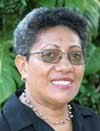New PRIPPP staff and related activities
 Dr James Wangi joined SPC and the PRIPPP team early in 2007 as Pandemic Influenza Preparedness Specialist, based in Papua New Guinea (PNG). He is from Tuonumbu Village, Kubalia, in PNG’s East Sepik Province.
Dr James Wangi joined SPC and the PRIPPP team early in 2007 as Pandemic Influenza Preparedness Specialist, based in Papua New Guinea (PNG). He is from Tuonumbu Village, Kubalia, in PNG’s East Sepik Province.
James worked as an epidemiologist/public health specialist for close to 20 years in PNG. Before his departure to work with SPC, he was director of the biggest branch of the national Department of Health, the Disease Control Branch. In this role, he managed Global Fund programmes in malaria, HIV and AIDS, tuberculosis, and other major infectious disease outbreaks such as SARS, anthrax scares, and avian influenza national response work. During that time, PNG made world history by eradicating poliomyelitis and eliminating leprosy as a public health issue (both in the year 2000), and James made a significant contribution to getting the health services on war-torn Bougainville back to normal. He also worked on non-communicable diseases, including those caused by tobacco. He has vast experience working with major international organisations, including WHO, UNICEF, UNFPA, AusAID and USAID.
Through PRIPPP, James aims to promote the work of SPC and international collaboration in PNG and the Pacific Islands region. Specifically, he wants to see PNG put together a complete, robust and decentralised response plan to deal with avian influenza, influenza pandemics and other disasters.
Procurement and logistics
 Ms Elizabeth Wrench joined SPC in July 2007 as Procurement and Logistics Officer for PRIPPP. Her main role is to purchase stockpiles of antiviral drugs and personal protective equipment (PPE) on behalf of SPC member countries and territories. These stockpiles will be stored in countries to be used for rapid containment of any incursion of avian or pandemic influenza. Elizabeth will also advise on the management of the stockpiles, from storage, inventory control and stocktaking through to replenishment. Her previous role as Chief Pharmacist for the Ministry of Health in Solomon Islands has given her a good understanding of the challenges of trying to transport, store, distribute and manage pharmaceutical and medical items in the region.
Ms Elizabeth Wrench joined SPC in July 2007 as Procurement and Logistics Officer for PRIPPP. Her main role is to purchase stockpiles of antiviral drugs and personal protective equipment (PPE) on behalf of SPC member countries and territories. These stockpiles will be stored in countries to be used for rapid containment of any incursion of avian or pandemic influenza. Elizabeth will also advise on the management of the stockpiles, from storage, inventory control and stocktaking through to replenishment. Her previous role as Chief Pharmacist for the Ministry of Health in Solomon Islands has given her a good understanding of the challenges of trying to transport, store, distribute and manage pharmaceutical and medical items in the region.
To date, SPC through PRIPPP has offered stockpiles of Tamiflu to each member country and these have been purchased. They were shipped in early December 2007 along with an information pack. Each country should include their antiviral distribution protocol, as endorsed by their national taskforce, with this information pack.
PRIPPP has also purchased Antigen AIV rapid test kits, which are capable of detecting the presence of influenza A virus in infected poultry. The kits are being offered to departments and ministries of livestock and agriculture to help them investigate reports of sick or dead birds. Elizabeth is currently distributing these as signed acceptance forms come in. In the future, SPC will offer specimen collection and transport equipment, enabling samples to be sent to reference laboratories.
Elizabeth is also working on the procurement of PPE to make up large ‘kits’ that will be provided to Pacific Island countries and territories (PICTs) for both animal health and human health-care workers. The kits are designed to be used as emergency stock for the rapid containment of an initial outbreak, and not to supplement day-to-day ‘core stock’. While comprehensive, they are intended only to supplement core stock in the event of an outbreak, before additional regional stockpiles can be dispatched.
Elizabeth looks forward to working with SPC members as part of the PRIPPP team, assisting countries to prepare for an influenza pandemic. She can be seen travelling around the Pacific with her scuba mask and fins poking out of her luggage.
Communication
 Ms Kate Graham is the Social Mobilisation and Communications Adviser for PRIPPP. Her task is to assist PICTs with their avian influenza and pandemic influenza communication plans. She is also advising PICTs on how to ensure that disaster management communication plans and health crisis communication plans – relating to animals or humans – are coordinated. In addition, she is working on regional coordination and communication plans to be implemented in the event of an avian influenza or pandemic influenza outbreak.
Ms Kate Graham is the Social Mobilisation and Communications Adviser for PRIPPP. Her task is to assist PICTs with their avian influenza and pandemic influenza communication plans. She is also advising PICTs on how to ensure that disaster management communication plans and health crisis communication plans – relating to animals or humans – are coordinated. In addition, she is working on regional coordination and communication plans to be implemented in the event of an avian influenza or pandemic influenza outbreak.
Kate has over 25 years, experience in analysing, reviewing, developing and implementing communications plans. She has spent the last six years working as a communications consultant in the Pacific region with the Solomon Islands Peace Monitoring Council, the Royal Solomon Islands Police, the Solomon Islands Intervention Taskforce, the Vanuatu Police Force, the Enhanced Cooperation Programme in Papua New Guinea and an ADB social and economic update project in Tonga.
Before working in the Pacific region, Kate worked in Australia for a major resources company, an agricultural statutory authority, a business lobby group, the National Art Gallery and the Victorian Department of Health. She began her public affairs career working in politics.
Legal issues
 Mrs Luseyane Rai Viliame was appointed as Legal Officer for PRIPPP at the end of September 2007. Prior to her appointment, she worked with the Attorney-General’s Office in Fiji as Senior Legal Officer in the Ministry of Health, a position that gave her wide experience in medico-legal issues. She also has a medical background in the field of oral health, where she acquired a special interest in community oral health and reaching out to communities. Luseyane also worked as Legal Adviser with the Tobacco Control Project in Fiji, in close collaboration with WHO at national, regional and international levels.
Mrs Luseyane Rai Viliame was appointed as Legal Officer for PRIPPP at the end of September 2007. Prior to her appointment, she worked with the Attorney-General’s Office in Fiji as Senior Legal Officer in the Ministry of Health, a position that gave her wide experience in medico-legal issues. She also has a medical background in the field of oral health, where she acquired a special interest in community oral health and reaching out to communities. Luseyane also worked as Legal Adviser with the Tobacco Control Project in Fiji, in close collaboration with WHO at national, regional and international levels.
Her role is to assist PICTs in reviewing and identifying gaps in their legislation and national policies and to recommend changes based on a standard guideline. This will help PICTs to adapt to the International Health Regulations (IHR) and Asia Pacific Strategy for Emerging Diseases (APSED) according to their needs, and to prepare for an influenza pandemic outbreak and other emerging diseases.
‘This is a challenging position, since we are addressing emergency situations. We will have to identify the highest level of authority and power before we can expect things to happen or change. In effect, that means I will be dealing with decision-makers and policy-makers in PICTs. But I’m looking forward to undertaking the task,’ says Luseyane.
Infection Control
 Ms Margaret Leong joined SPC in October 2007 as Infection Control Officer for PRIPPP. Prior to her appointment, Margaret worked for the Ministry of Health in Fiji. Being the pioneer of infection control in Fiji, she brings with her a wealth of experience.
Ms Margaret Leong joined SPC in October 2007 as Infection Control Officer for PRIPPP. Prior to her appointment, Margaret worked for the Ministry of Health in Fiji. Being the pioneer of infection control in Fiji, she brings with her a wealth of experience.
She says, ‘My role as Infection Control Officer involves strengthening infection control capacity in the Pacific Islands through the provision of basic infection control training and programme establishment.’ Margaret will build on the work carried out by Ms Peta-Anne Zimmerman, who was the short-term Infection Control Specialist at SPC from the end of 2005 to the beginning of 2006.
Margaret will be visiting at least 10 PICTs to conduct infection control training and, more importantly, training in putting on and removing PPE in preparedness for an influenza pandemic. She is currently working on the final stages of the draft Regional Infection Control Guidelines, which have been posted on the PICNet/PPHSN website (Readers are invited to send in comments before the guidelines are finalised.)
In addition, Margaret is working on five posters, which will be published by SPC shortly, on hand washing, putting on and removing PPE, cough/hygiene etiquette, and standard and additional precautions. Four posters are already available in pdf format on the PICNet/PPHSN website.
For more information on PRIPPP activities, visit SPC’s Public Health Surveillance and Communicable Disease Control Section website.

